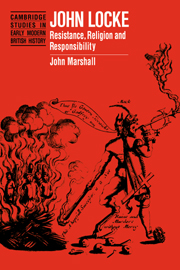Book contents
- Frontmatter
- Contents
- Acknowledgements
- List of abbreviations
- Introduction: Locke's intellectual development
- PART I RELIGION AND THE POLITICS OF TOLERATION
- PART II RESISTANCE AND RESPONSIBILITY
- 5 Locke's moral and social thought 1660–81: the ethics of a gentleman
- 6 Resistance and the Second Treatise
- 7 Locke's moral and social thought 1681–1704
- PART III HERESY, PRIESTCRAFT AND TOLERATION; JOHN LOCKE AGAINST THE ‘EMPIRE OF DARKNESS’
- Conclusion
- Bibliography
- Index
- Cambridge Studies in Early Modern British History
6 - Resistance and the Second Treatise
Published online by Cambridge University Press: 07 January 2010
- Frontmatter
- Contents
- Acknowledgements
- List of abbreviations
- Introduction: Locke's intellectual development
- PART I RELIGION AND THE POLITICS OF TOLERATION
- PART II RESISTANCE AND RESPONSIBILITY
- 5 Locke's moral and social thought 1660–81: the ethics of a gentleman
- 6 Resistance and the Second Treatise
- 7 Locke's moral and social thought 1681–1704
- PART III HERESY, PRIESTCRAFT AND TOLERATION; JOHN LOCKE AGAINST THE ‘EMPIRE OF DARKNESS’
- Conclusion
- Bibliography
- Index
- Cambridge Studies in Early Modern British History
Summary
Many reasons for Locke's opposition to Filmer's arguments are by now obvious. Locke had no doubt that James would be an English Louis XIV when he succeeded to the throne, and had feared from the mid-1670s that Charles II was inclined towards absolutism. Filmer's works were among the most powerful which opposed historical Parliamentary rights to alter the course of the succession and the most powerful theoretical argument supported by clerics endorsing Charles' moves towards absolutism, especially in the years following the dissolution of the 1681 Oxford Parliament. As royalism came to be increasingly dependent upon clericalist and biblicist Filmerian patriarchalism instead of the more moderate and constitutionalist royalism of many Restoration legists, Locke would have had good reason to oppose Filmer's arguments even if his own thought had not developed at all from his commitments of the mid-1670s. He had long been opposed to any claim to jure divino absolute monarchy, and especially to those Anglican clerics who campaigned for jure divino monarchy in order to gain royal support for jure divino episcopacy.
It is possible to see Locke's arguments in the Second Treatise very largely as a series of natural responses, based upon Locke's preceding and developing commitments, to the precise problems posed by Filmer's arguments for patriarchalism, and particularly to the problems posed by Filmer's attacks on those previous commentators on natural law who had asserted that political society originated from consent.
- Type
- Chapter
- Information
- John LockeResistance, Religion and Responsibility, pp. 205 - 291Publisher: Cambridge University PressPrint publication year: 1994
- 1
- Cited by



